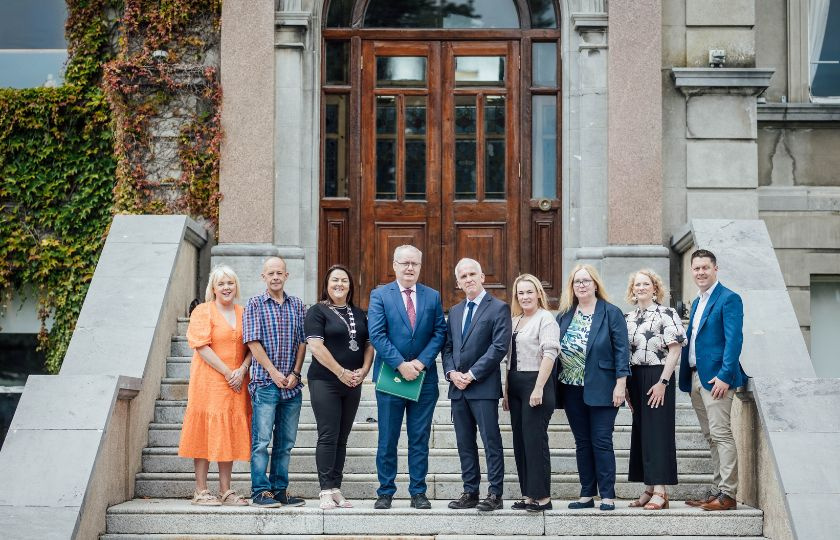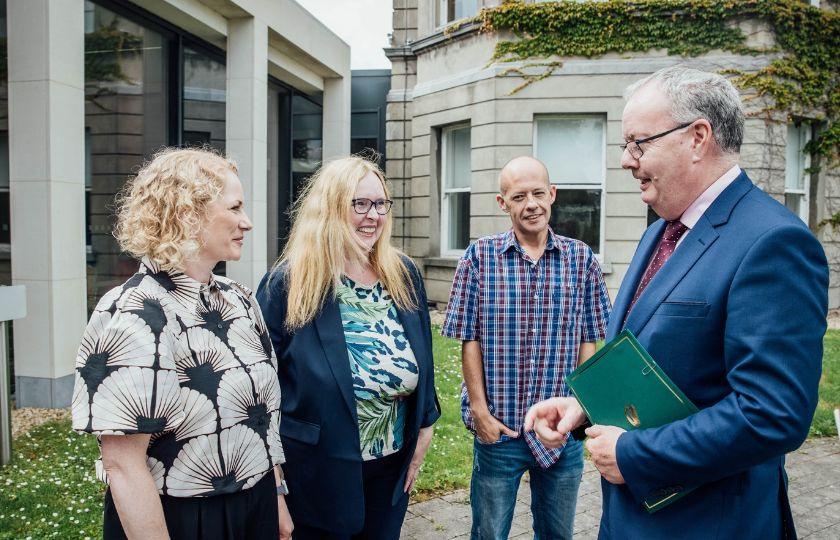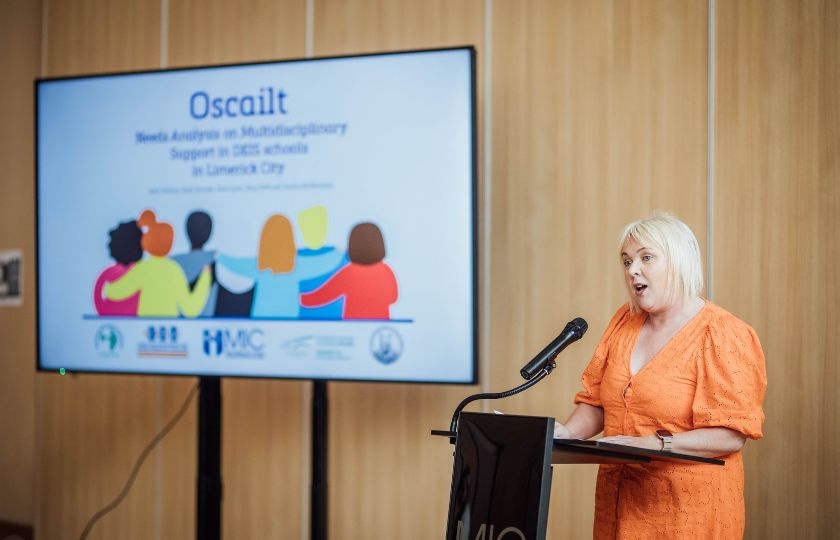
Pictured L-R: Tracie Tobin, Principal of St Michael’s Infant School and INTO Central Executive Committee representative for Limerick and Kerry; Dr Justin McNamara, English Language & Literature Department at MIC and co-author of the report; Cllr Catherine Slattery, Mayor of Limerick Representative; Michael Moynihan TD, Minister of State for Special Education and Inclusion; Prof. Dermot Nestor, President of MIC; Sonya Ryan, Parent of children in Corpus Christi Primary School; Beth Hickey, co-author of the report and Project Officer at the Curriculum Development Unit at MIC; Dr Ruth Bourke, Lead researcher of the report and Assistant Professor and Coordinator of the TED Project at MIC; and Dennis Barry, Principal of Scoil Iosagáin CBS Primary School, Oscailt Principals Network.
Newly published research by Mary Immaculate College (MIC) reveals a critical need for increased onsite multidisciplinary support in DEIS schools across Limerick City, where school staff are often left to make difficult decisions due to a lack of available services.
The Oscailt Needs Analysis on Multidisciplinary Support in DEIS Schools in Limerick City report—launched on Monday, 16 June by Minister of State for Special Education and Inclusion, Michael Moynihan TD— finds that children in DEIS Band 1 and post-primary schools are languishing for years on waiting lists for essential services, including mental health supports, because their families cannot afford to access them privately. Without enough support services available, school staff are often left to decide which vulnerable children get help and which do not—something some have described as feeling like they have to “play God”.
The research, conducted by the Transforming Education through Dialogue (TED) Project at MIC’s Curriculum Development Unit, identifies an urgent need and growing need for services such as creative therapies (art, music and play therapy), family support services, Child and Adolescent Mental Health Services (CAMHS) and enhanced access to the National Educational Psychological Service (NEPS). It also stresses that the scale of need has intensified in the wake of the COVID-19 pandemic.
Thirteen schools in the Oscailt Network—a collective of DEIS schools in Limerick City facilitated by MIC—participated in the research, which was funded through the Limerick City and County Council Regeneration Economic and Social Intervention Fund. These schools serve some of the city’s most socioeconomically disadvantaged communities, including Ballinacurra Weston, Southill, St Mary’s Park, and Moyross.
Minister Moynihan welcomed the publication of the report, commenting:
“This is a very timely piece of research that set out to establish the level of need for multidisciplinary support onsite in DEIS schools in Limerick City following the pandemic. Multidisciplinary support, such as creative therapies like art, music, play therapy, speech and language therapy, occupational therapy, physiotherapy, counselling, and psychological support, is key in supporting the academic, social, and emotional development of many children with additional needs. Collaboration between schools and multidisciplinary professionals in schools helps to address the complex needs of students and is increasingly important for creating inclusive learning environments so that children can participate fully and equally in their educational journeys. This research also aligns with the government’s commitment to develop an Education Therapy Service, which will see therapists under the NCSE working on site in schools during the school day to support children. Beginning in Special Schools during the 2025/2026 school year, this will then expand to mainstream schools, and will, I believe, help address some of the issues raised in this report.”

The research also included the voices of the children, parents, and professionals working across statutory, community, and voluntary services. Among the findings was a marked increase in service uptake when interventions were provided onsite in schools—spaces where children feel safe and supported, and where parents already have trusted relationships with school staff.
Dr Ruth Bourke—Lead researcher of the report and Assistant Professor and Coordinator of the TED Project at MIC—said:
“This research shows that big challenges in the health and education systems—like staff shortages and long waiting lists—are stopping children and young people in Limerick’s city centre and Regeneration communities, such as Ballinacurra Weston, Southill, St. Mary’s Park and Moyross, from getting the support they need. These delays are holding them back in both their education and access to healthcare, which affects their overall wellbeing and future chances in life. But this situation can change. What we need now is a joined-up, well-planned strategy that brings schools, services, and communities together to give these students the right support, when and where they need it.”
Professor Dermot Nestor, President of MIC, also welcomed the report’s publication and praised the commitment of the Oscailt Network schools and the TED Project in addressing the socioeconomic pressures:
“The Oscailt Needs Analysis highlights what schools in disadvantaged areas of Limerick have known for a long time—that poverty, trauma, and a lack of access to services are holding children back. What is striking is how much these schools are already doing to respond to the wider social and economic pressures their students live with daily, often well beyond their core role. The findings of this report point to the value of accessible, multidisciplinary, school-based supports that meet children where they are and help level the playing field.”




